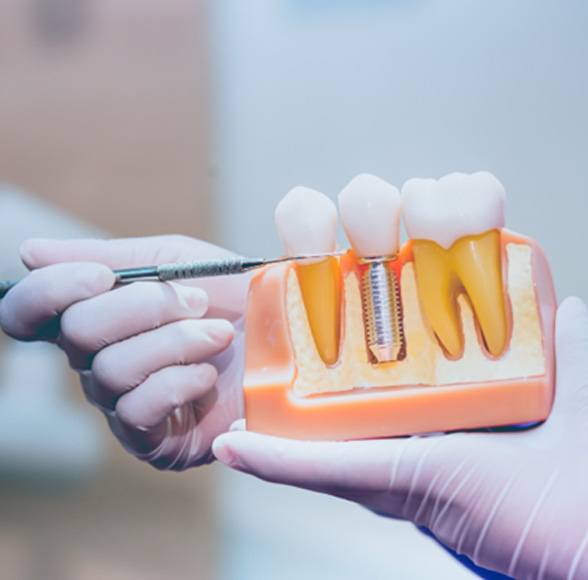Dental Implant Failure & Salvage – Williamstown, NJ
Save Your Restored Smile
Dental implants are a highly successful treatment with a success rate of over 95%! However, in rare cases, dental implant failure can occur. While this isn’t something that most patients will need to worry about, it is still something you should be aware of so you can recognize the symptoms and know when to seek treatment. If you are ever concerned that you’re experiencing a dental implant failure, contact our office . This way, we can help to save your restored smile.
Why Do Dental Implants Fail?

The most common cause of dental implant failure is an infection called
peri-implantitis. This is when bacteria invade the tissue around the implant. Eventually, the jawbone and gums become damaged, can deteriorate, and lose their ability to support the implant. Poor oral hygiene is often to blame, but other factors can also contribute. Besides peri-implantitis, here are some other factors that can contribute:
- Failed osseointegration
- Physical trauma
- Certain medical conditions
Symptoms of a Failed Dental Implant

Dental implant failures can happen shortly after the implant placement surgery and even years or decades afterward. Here are some symptoms that are often experienced:
- Unusual or severe pain after you heal. Some soreness is normal after the placement, but once the area has healed, your implants should feel comfortable and natural.
- Loose dental implant. Sometimes, this can be due to a problem with your restoration, but other times, it can mean dental implant failure.
- Bleeding, swelling, and pus. These are all signs of a possible infection and require attention right away.
- Difficulty chewing. Once you receive your implant, you should be able to eat pretty much any food without an issue.
How Dental Implant Salvage Works

If you think that there may be an issue with one of your dental implants, you should contact us right away. This way, Dr. Kassem can examine your mouth, learn about your symptoms, and talk to you about your options. Sometimes, it is possible to save dental implants with deep dental cleanings, antibiotics, and other infection control measures. The sooner that you seek treatment, the more likely it is that we will be able to get you back on track. If the damage to the implant or the surrounding area is severe, the implant may need to be removed. After restoring your oral health, you may be able to receive a new dental implant.




